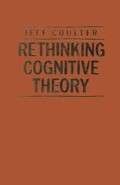Abstract
The theory of token physicalism may be stated thus: for any given occasion on which you or I are actually in mental state M (say, in a state of pain), being in that particular mental state is identical to being in brain (or CNS) state S. There is quite a large philosophical literature dealing with this claim;1 I refer to it here as a ‘theory’ in recognition of its research-guiding function in some recent neuroscientific work. For example, in his paper ‘From Neuron to Behavior and Mentation’, Mario Bunge asserts that ‘thinking is identical with (reducible to without remainder) the activities (functions) of certain neural systems.’2 Bunge clearly had in mind here something like the case in which one may engage in ‘silent soliloquy’ or ‘interior monologue’. (We shall return to discuss interior monologue in detail in a later section of the present work dealing with ‘thinking’.)
Access this chapter
Tax calculation will be finalised at checkout
Purchases are for personal use only
Preview
Unable to display preview. Download preview PDF.
Notes
See, inter alia, David Randall Luce, ‘Mind-Body Identity and Psycho-Physical Correlation’, Philosophical Studies, vol. 17, 1966;
Thomas Nagel, ‘Physicalism’, The Philosophical Review, vol. 74, 1965;
Jaegwon Kim, ‘On the Psycho-Physical Identity Theory’, American Philosophical Quarterly, vol. 3, 1966;
D. Wiggins, ‘Identity, Designation, Essentialism, and Physicalism’, Philosophia, vol. 5, 1975;
L. F. Mucciolo, ‘The Identity Thesis and Neuropsychology’, Nous, vol. 8, 1974, and the collection entitled The Mind/Brain Identity Theory, edited by C.V. Borst (London: Macmillan, 1970).
Mario Bunge, ‘From Neuron to Behavior and Mentation: An Exercise in Levelmanship’ in H.M. Pinsker and W.D. Willis Jr (eds), Information Processing and the Nervous System (New York: Raven Press, 1980), p. 14. Bunge does proceed to note, however, that neural processes cannot be exclusively constitutive of ‘thoughts’: he adds that their content is ‘partially dependent on what others around you and before you have thought’, (ibid.) leaving the theoretical door open for ‘social psychology, sociology, history, etc.’ (ibid.)
Saul Kripke, ‘Naming and Necessity’ in Donald Davidson &;amp; Gilbert Harman (eds), Semantics of Natural Language (Boston: D. Reidel, 1972).
Ibid., pp. 340–41.
Ibid., p. 341. (Because this is, I think, the crux of Kripke’s argument against any form of the psychoneural identity thesis, I have omitted any reference to his (risky) notion of ‘rigid designation’ in this connection, although it is obviously related to his view that scientifically defined indiscernibles comprise necessary (‘essential’) relata when confirmed.)
Donald Davidson, ‘Mental Events’ in Ned Block (ed.), Readings in Philosophy of Psychology (Cambridge, Mass.: Harvard University Press, 1980).
Ibid., p. 117. Davidson is here attending to the basically Wittgensteinian insight that ascriptions of mental predicates to persons vary in respect of our assessments of the overall coherence of their conduct in its circumstances and in the light of standards of rationality therein applicable.
Ibid., p. 116.
Ibid., p. 118.
See Sydney Shoemaker, ‘Functionalism and Qualia’ in Block, Readings in Philosophy. Shoemaker is careful to note that the ‘qualia’ problem does not involve most mental concepts/predicates. Indeed, as J.F.M. Hunter pointed out in his ‘Wittgenstein and Materialism’, in Mind, vol. 86, no. 344, October 1977, p. 519, forms of thinking have a ‘vanishing phenomenology’ when subjected to careful analysis.
Author information
Authors and Affiliations
Copyright information
© 1983 Jeff Coulter
About this chapter
Cite this chapter
Coulter, J. (1983). On token physicalism and anomalous monism. In: Rethinking Cognitive Theory. Palgrave Macmillan, London. https://doi.org/10.1007/978-1-349-06706-0_3
Download citation
DOI: https://doi.org/10.1007/978-1-349-06706-0_3
Publisher Name: Palgrave Macmillan, London
Print ISBN: 978-1-349-06708-4
Online ISBN: 978-1-349-06706-0
eBook Packages: Palgrave Religion & Philosophy CollectionPhilosophy and Religion (R0)

